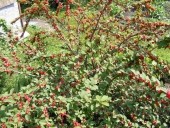





Kena Landry wrote: Otherwise, what would be our option?

Jay Angler wrote: But I don't get a more than 3 cherries a year do to all the critters that love cherries and are willing to grab them ALL!
Josh Warfield wrote:I'm in my first year of gardening, but did a whole lot of reading before I ever planted anything, and got completely sold on the "landrace gardening" concept.
Part of that concept is that plants should evolve pest resistance if you just don't bother protecting them from pests. Sounds great to me, so I left my garden completely unfenced (besides the cattle fence at the property line). Then I met the rabbits and the pack rats. They eat every single sunflower as soon as it gets to about 6 or 8 inches tall. Beans are gone before they grow their second set of leaves. Lettuce gets wiped out when it's barely done germinating. All but one melon plant was gone within a week of sprouting, and then the one surviving plant had all its flowers eaten. I wouldn't mind a very low survival rate in the first year, but it sucks to have to start from scratch on multiple entire species. The only plants I grew that I'm still fairly hopeful will produce seed are the squash; I guess they just don't like the hairy leaves or something. Some of the casualties are certainly due to my inexperience as a gardener, but that will be less of a problem next year, while the critters are gonna be the same.
So apparently, I was way too optimistic about this. Did I just have really bad luck, or did I fundamentally misunderstand what's meant by pest resistance?
On a related note, is there any such thing as an affordable rodent-proof fence? These pack rats are particularly aggravating, due to their habit of cutting down a plant and then just leaving it sitting there, not even eating it. WHY?!?
Florence Van Vorst wrote:My asparagus ferns block the sun from my strawberries. My strawberry patch is now in the shade. We are from northern NJ.